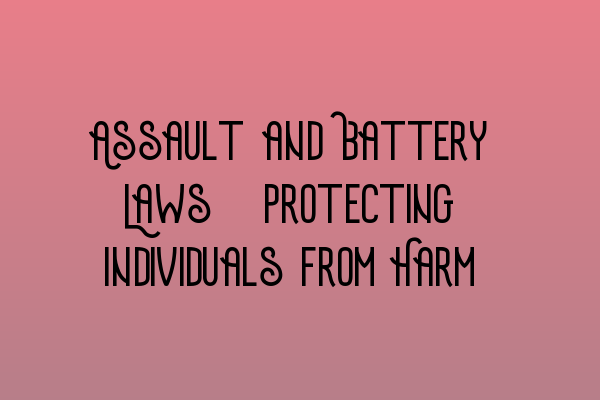Assault and Battery Laws: Protecting Individuals from Harm
Assault and battery are two of the most common crimes in the UK, and they can have serious consequences for both the victim and the perpetrator. It is important to understand the laws surrounding assault and battery in order to protect individuals from harm and ensure justice is served.
The Difference Between Assault and Battery
Before delving into the details of assault and battery laws, it is crucial to understand the distinction between the two offenses. Assault refers to the intentional act of causing a person to apprehend immediate physical harm, while battery involves unlawfully and intentionally touching another person without their consent.
While assault and battery are often used interchangeably in common parlance, they are distinct crimes with different legal definitions. It is important to consult a criminal law expert, like the professionals at SQE Criminal Law & Practice Law UK, to fully understand the nuances and potential consequences of these offenses.
Elements of Assault and Battery
Now, let’s dive into the elements that constitute assault and battery:
Assault:
Assault can be broken down into three key elements:
- An intentional act
- The act causes the victim to apprehend immediate physical harm
- The victim’s apprehension of harm is reasonable
For example, if someone raises their fist and threatens to strike another person, that can be considered an assault. Even if no physical contact occurs, the act of raising the fist and creating a reasonable fear of physical harm fulfills the elements of assault.
Battery:
Battery consists of the following elements:
- An intentional and unlawful touching
- The touching is without the consent of the victim
It is important to note that for an act to be considered battery, there must be physical contact involved. A mere threat without physical contact would constitute assault rather than battery.
Possible Penalties for Assault and Battery
The penalties for assault and battery vary depending on the severity of the offense and any aggravating factors. In the UK, assault and battery offenses are generally categorized as either common assault or actual bodily harm (ABH), grievous bodily harm (GBH), or wounding with intent.
Common assault is the least severe of the offense categories and carries a maximum penalty of six months imprisonment or a fine. ABH carries a maximum penalty of five years imprisonment, while GBH and wounding with intent can result in much more severe penalties, including life imprisonment.
If you or someone you know is facing charges related to assault or battery, it is essential to seek legal advice from an experienced criminal law solicitor. They can assess the specific circumstances of the case and provide guidance on the best course of action.
Protecting Individuals: Understanding and Enforcing Assault and Battery Laws
Assault and battery laws are in place to protect individuals from harm and to ensure the safety and well-being of society as a whole. By understanding the elements of these offenses, individuals can take proactive measures to avoid being victims and know their rights.
If you are interested in deepening your understanding of criminal practice and enhancing your expertise in the field, SQE Criminal Law & Practice Law UK offers workshops and seminars that can expand your knowledge. These events provide valuable insights into the latest updates in UK criminal laws, helping you stay informed and prepared.
To further enhance your SQE criminal law study group experience, SQE Criminal Law & Practice Law UK offers resources and support systems that foster collaborative learning and skill development. Joining a study group can provide valuable opportunities for discussion, problem-solving, and exam preparation.
Decoding criminal evidence rules is another essential aspect of successfully navigating the criminal justice system. SQE Criminal Law & Practice Law UK offers a detailed analysis of these rules, helping you understand how evidence is collected, presented, and evaluated in criminal cases.
Lastly, if you are interested in exploring the realm of fraud and financial crimes in the UK, SQE Criminal Law & Practice Law UK offers a deep dive into this complex area of criminal law. Understanding the intricacies of fraud laws can be invaluable for both legal professionals and individuals seeking protection against financial crimes.
By continuously expanding your knowledge and staying informed about criminal laws and practices, you can play an active role in protecting individuals from assault and battery and other criminal offenses.
Remember, protecting yourself and others starts with knowledge and awareness of the laws that are in place. Seek legal advice and educate yourself about the rights and responsibilities pertaining to assault and battery. Together, we can create a safer and more just society.
